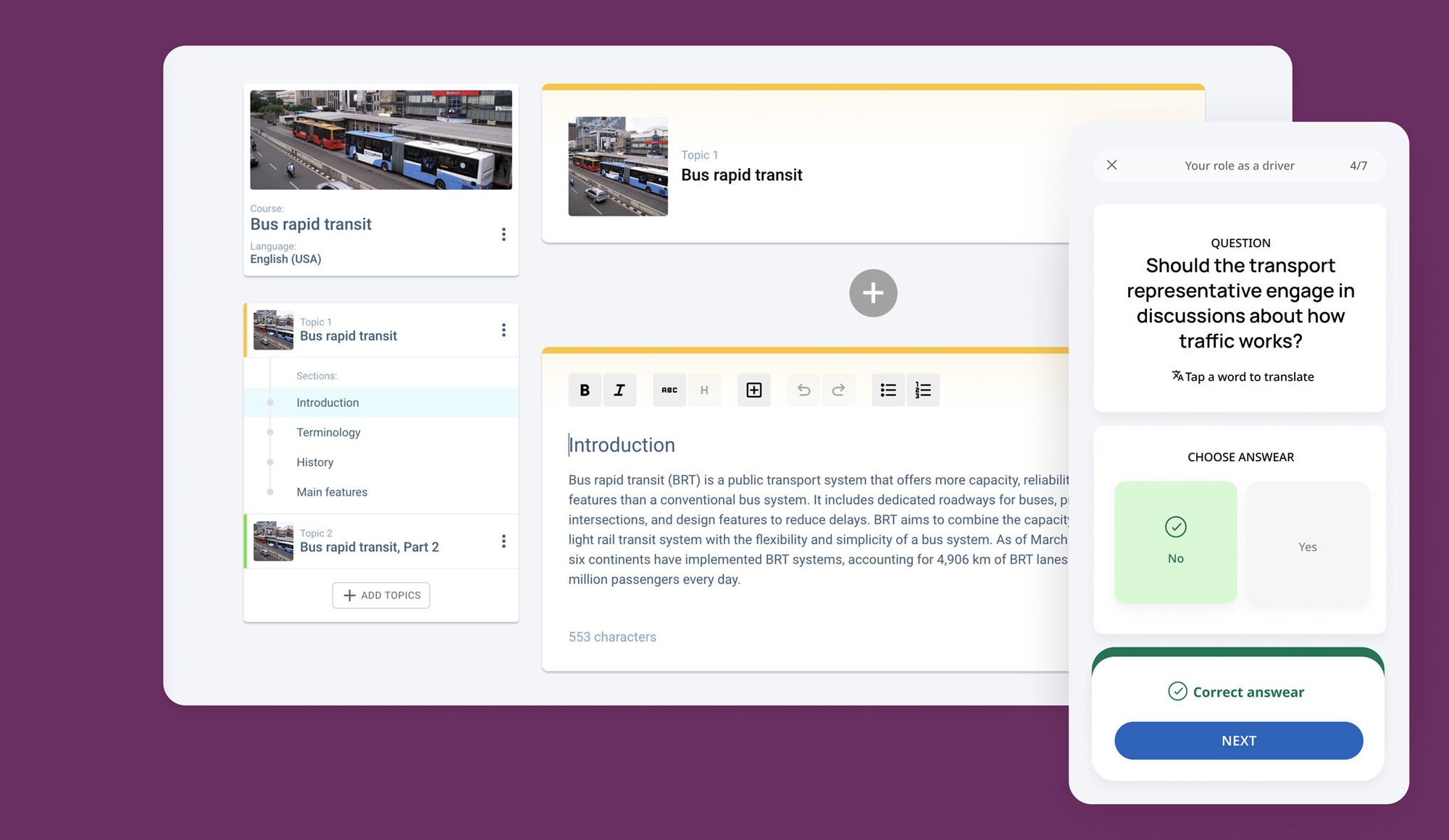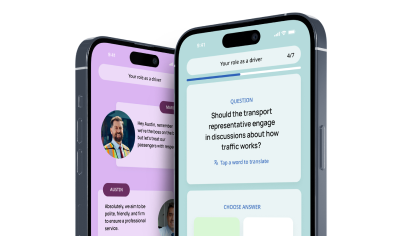Employee engagement is a crucial factor in running a successful business. Engaged employees are more productive, so they contribute to a positive work culture and significantly impact a company's overall success. This article will explore the importance of good employee engagement, focusing on frontline employees. We will also discuss seven strategies that can effectively boost morale and engagement among frontline workers, leading to a more motivated and cohesive team.
What is good employee engagement for frontline employees?
Employee engagement refers to employees' emotional commitment and dedication to their work and organisation. It goes beyond job satisfaction and reflects employees' enthusiasm and passion towards their roles. Engaged employees are more willing to go the extra mile, take initiative, and actively contribute to the company's goals and success.
When employees are engaged, they feel connected to their work and the organisation. They understand their role and how it contributes to the larger picture. They feel valued, supported, and appreciated for their efforts, leading to higher job satisfaction and productivity.
Furthermore, good employee engagement can also positively impact employee retention. Engaged frontline staff are likelier to stay with the company longer as they feel a sense of loyalty and commitment. This can reduce turnover rates and the associated costs of recruiting and training new staff.
Moreover, organisations with high employee engagement often experience lower absenteeism rates. Engaged employees are more motivated to come to work and are less likely to take unnecessary sick days or time off. This can increase staff productivity and create a more positive workplace environment.
Why worry? Frontline employee engagement impact on the business
Frontline employees are the face of your organisation. The customer service representatives, sales associates, and support staff interact with customers daily. Their level of engagement has a direct impact on customer satisfaction and loyalty.
Engaged frontline workers are more likely to provide exceptional customer service, resolve issues effectively, and create positive customer experiences. They understand the importance of their roles in building and maintaining customer relationships, and their engagement directly influences customer perceptions of the brand.
Furthermore, engaged frontline workers are likelier to foster positive relationships with their teammates, improving teamwork and collaboration. This, in turn, enhances overall productivity and efficiency within the organisation.
Organisations must invest in strategies that boost frontline engagement. One effective way to achieve this is through regular training and development opportunities. By providing employees with the necessary skills and knowledge to excel in their roles, organisations can empower them to deliver exceptional service and confidently handle customer interactions.
Moreover, recognising and rewarding frontline employees for their hard work and dedication can increase their motivation and job satisfaction. Incentives such as bonuses, performance-based rewards, and public acknowledgement of achievements can go a long way in boosting morale and fostering a culture of excellence within the workforce.
7 strategies for boosting frontline employee engagement
1. Create a recognition program with gamification
Recognising and appreciating frontline employees' hard work and achievements is critical to boosting their engagement. Implementing a recognition program incorporating gamification elements can make the process more exciting and interactive. Consider introducing a points-based system or leaderboards to encourage healthy competition and motivate employees to strive for excellence.
When creating a recognition program with gamification, it's essential to consider the specific elements that will resonate with your employees. For example, you could introduce badges or virtual rewards that employees can collect and display on their profiles. This adds a fun and competitive element and allows employees to showcase their achievements to their peers, fostering a sense of pride and motivation.
2. Provide learning opportunities and partner with local institutions
Investing in frontline employees' personal and professional development shows that you value their growth. Provide opportunities to learn new skills and expand their knowledge through training programs, workshops, or seminars. Additionally, consider partnering with local educational institutions to offer further educational opportunities, such as certification courses or apprenticeships.
Providing learning opportunities and partnering with local institutions can profoundly impact frontline workers. By offering access to training programs or workshops, you empower them to acquire new skills and knowledge to enhance their performance and open up new career paths. Moreover, partnering with local educational institutions benefits your employees and strengthens your ties with the community, showcasing your commitment to supporting local talent.
3. Implement a flexible workday policy
Flexibility in scheduling can significantly improve frontline employee engagement. Offering flexible work hours or remote work options allows employees to manage their personal and professional commitments better. This flexibility fosters a sense of trust and autonomy, leading to increased job satisfaction and work-life balance.
Implementing a flexible workday policy requires careful planning and consideration. Clear guidelines and expectations must be established to ensure that flexibility doesn't lead to confusion or a lack of productivity. By striking the right balance, you enable employees to manage their responsibilities better while still meeting their work obligations, increasing job satisfaction and overall engagement.
4. Encourage the referral program
Frontline employees often have extensive networks and can be a great source of talent for your organisation. Implement a referral program that incentivises employees to refer qualified candidates for open positions. This will boost employee engagement by involving them in the hiring process and help you attract top-quality candidates through trusted recommendations.
Encouraging a referral program can tap into the vast networks of frontline employees. By incentivising them to refer qualified candidates, you involve them in the hiring process and create a sense of ownership and pride in building a solid team. This approach saves time and resources in the recruitment process and brings in candidates more likely to align with your company's culture and values.
5. Use communication channels with the space for open communication
Effective communication fosters engagement and builds strong relationships with frontline workers. Utilise communication channels that encourage open and transparent communication, such as team meetings, feedback sessions, and suggestion boxes. Actively listen to employees' concerns, ideas, and suggestions, and provide timely feedback and updates to ensure they feel heard and valued.
Moreover, effective communication channels play a crucial role in engaging frontline employees. While digital communication tools are widely used, it's essential to recognise the power of offline channels. By strategically placing posters or having a dedicated office newspaper, you can capture employees' attention and deliver important messages visually appealing and engagingly. This approach ensures that crucial information is preserved in the digital noise, allowing employees to feel more connected and informed about the company's happenings.
6. Set spaces for informal gatherings and hobby groups
Creating spaces for informal gatherings and hobby groups allows frontline workers to connect with their colleagues more personally. This promotes camaraderie and helps build a sense of belonging within the team. To encourage these connections, consider organising regular team-building activities, social events, or hobby-related clubs.
Creating spaces for informal gatherings and hobby groups fosters a sense of camaraderie and belonging within the team. Organising regular team-building activities or hobby-related clubs provides employees with opportunities to bond and connect personally. This enhances teamwork and collaboration and creates a positive and supportive work environment.
7. Experiment with creative offline channels of communication: posters, newspapers, TVs
In a technologically advanced world, offline communication channels may seem overlooked. However, creative offline mediums like posters, newspapers, or even office TVs can effectively deliver important messages and announcements. These channels provide an opportunity to display recognition, share success stories, and communicate company updates or values in an engaging and visually appealing way.
By implementing these strategies and paying attention to your frontline employees' unique needs and preferences, you can significantly boost their engagement and create a thriving and motivated workforce.
Measuring the impact of engagement strategies
Implementing the strategies mentioned above is just the first step. To ensure your efforts' effectiveness, measuring your engagement initiatives' impact is essential. Regularly assess critical metrics such as employee satisfaction, productivity levels, customer satisfaction, and turnover rates. Conduct surveys, hold focus groups, and evaluate performance metrics to gauge progress and make necessary adjustments to your engagement strategies.
Furthermore, it is crucial to analyse the data collected from these measurements systematically and thoroughly. By delving deep into the statistics and trends, you can uncover valuable insights into the strengths and weaknesses of your engagement strategies. This detailed analysis can help you identify patterns, correlations, and areas for improvement, enabling you to fine-tune your approach for maximum impact.
Moreover, consider implementing innovative tools and technologies to enhance your measurement capabilities. Advanced analytics software, artificial intelligence, or machine learning algorithms can provide sophisticated data analysis techniques, allowing you to gain a more comprehensive understanding of the effects of your engagement strategies. By embracing cutting-edge technology, you can stay ahead of the curve and continuously refine your engagement initiatives to drive sustainable success.
Transform your frontline workforce with Lingio
Ready to elevate your frontline employee engagement to new heights? At Lingio, we blend the power of artificial intelligence with the excitement of gamification and the personalised touch of coaching to create a learning experience that's both enjoyable and effective. Technical experts and seasoned educators have crafted our AI Course Creator to ensure your staff learns and thrives. Take advantage of the opportunity to see our innovative approach in action. Book a demo today and watch your team's morale soar with Lingio.
FAQs
1. How can I tell if frontline workers are engaged?
Look for signs such as enthusiasm, proactiveness, and a positive attitude towards work. Engaged employees are usually more motivated, take ownership of their tasks, and actively contribute to team success. Also, you can rely on an employee engagement survey for calculating the overall eNPS, which usually sounds like "How likely are you to recommend the company you work in?". If the answer is higher than the 8 score, your employees are engaged. Make sure you do this evaluation at least quarterly to see the dynamics.
2. Why does frontline employee engagement matter more than other roles?
Frontline workers directly interact with customers and are the face of your brand. Their engagement significantly impacts customer satisfaction, loyalty, and your company's reputation.
3. How often should recognition be given to frontline workers?
Regular and timely recognition is crucial for maintaining high levels of engagement. It's essential to consistently acknowledge and appreciate frontline employees' efforts to keep their motivation levels high. Different world-known leaders in HR communicate the need to recognise employees at least once a month. It can even be a small thank you gesture during a team meeting or a custom thank you note to keep engaging frontline workers.
4. Can engagement strategies work for all frontline workers?
While general strategies can apply to most frontline employees, it's crucial to understand their unique needs and preferences. Employee engagement surveys, focus groups, and open communication channels can help tailor strategies to specific teams or individuals. It is essential to engage frontline employees while understanding different means of motivation to tailor the strategy.
5. How do we make the topic of frontline employee engagement critical for the leadership?
It is vital to communicate the business outcomes of the disengaged employees. Though the results might be long-term, leaders will see the impact. You can show the numbers and statistics on how employee morale influences employee feedback and their desire to stay within the company. With frontline disengagement, dealing with the turnover and new hires is more expensive. Communicating this importance, powered by statistics, can help you get the leaders' buy-in for boosting your employee engagement strategy.


Table of contents
Intro
What is good employee engagement for frontline employees?
Why worry? Frontline employee engagement impact on the business
7 strategies for boosting frontline employee engagement
Measuring the impact of engagement strategies
Transform your frontline workforce with Lingio
FAQs

